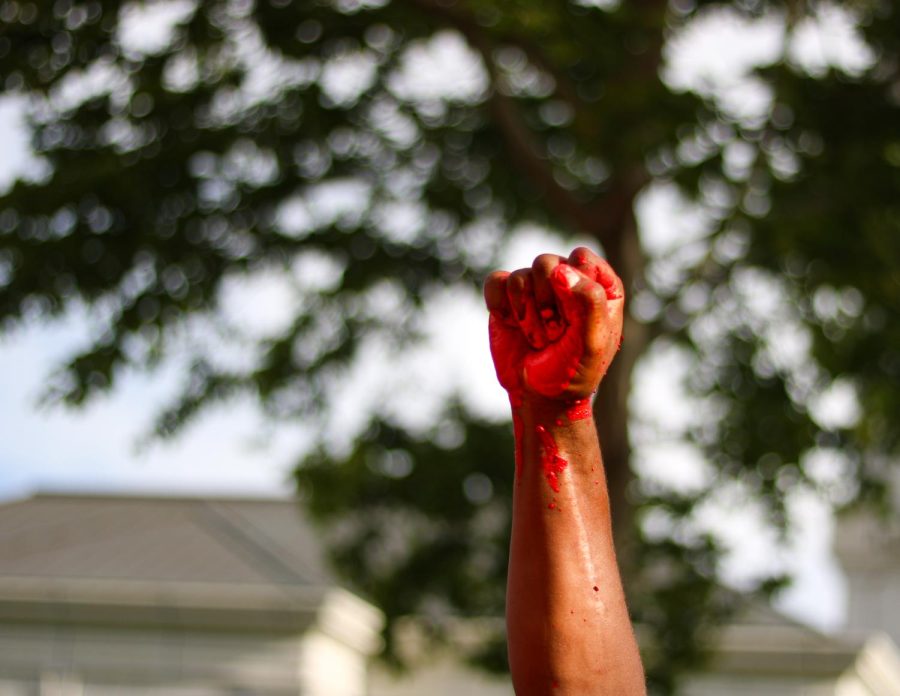Buening: Beware of Performative Activism
March 3, 2022
I subscribe to the age-old saying that “actions speak louder than words.” However, as an avid reader, writer and aspiring political activist, I’ve always appreciated how words can impact people. Powerful language can yield powerful results. But words mean next to nothing unless they are supported by intention — the commitment to action with an aim or purpose.
Performative activism — on the part of individuals and institutions — makes a mockery of allyship. Our intentions must go beyond offering weak or feigned support to causes. Achieving systemic-level change requires that we actively pursue it.
From Individuals
I remember the first time I was called a “social justice warrior.” As a teenager becoming more politically aware, I didn’t know what it meant. Isn’t fighting for social justice a good thing? Now, I realize the critique. My excessive social media reposts made my personal validation seem more important than the issues I claimed to support.
But posting on social media doesn’t automatically make you a performative ally. Social media can serve as a valuable platform for raising awareness and there’s nothing wrong with promoting your views. But it all comes down to intentions.
Activist Latham Thomas defined optical allyship as something that “makes a statement,” but “is not aimed at breaking away from the systems of power that oppress.” After all, how can we call ourselves “activists” without getting actively involved? It’s easier to sit on the sidelines and mimic support than to dismantle entire systems of oppression. This is because true activism requires deviating from established structures — even ones that may benefit us. It requires speaking up, engaging in difficult conversations and challenging our world views. We must be willing to endure an uphill, often uncomfortable battle.
When we lack this commitment, performative activism yields real consequences. A recent New York Times video explored what happens in blue states with Democrat majorities in office. As a progressive myself, I’d hope to see the professed values of the Democratic party instituted in policy. Sadly, this rarely happens. Blue America has a housing crisis, as well as some of the most extreme disparities in education funding. These conditions ring true for Salt Lake City, a blue city with a large homeless population. Many affluent Democrats oppose building shelters near their own neighborhoods. As a result, the SLC council continues to place temporary shelters only in economically disadvantaged areas.
From Institutions
Individuals aren’t the only ones that engage in performative activism. Corporations, governments and colleges take part. By feigning “wokeness,” institutions can appeal to the demands of their consumers while remaining complacent to business as normal.
Lauren McCluskey’s death highlighted many institutional failures from the University of Utah. While the university expressed sincere condolences following her murder and named a track after her, they took no adequate measures to prevent similar things from happening in the future. Campus police and Salt Lake police failed to listen to Lauren’s reports of harassment and extortion. In the year after her death, reported rapes actually increased.
The U’s performative activism extends into divestment from fossil fuels. Taylor Monney from DivestU, a student organization dedicated to reducing the U’s reliance on and funding of fossil fuels, commented that while the university has taken progressive environmental measures and set up goals for the future, “they often use those goals as reasons to not take more action.” Combatting the climate crisis demands, “everything that we can do,” he said. We cannot “rest on the laurels” of what we’ve already done.
Active Approaches
We need to dismantle performative activism. Although we are inevitably imperfect activists, we can always become more effective ones. Sometimes, listening is the most active thing we can do. After learning from Indigenous perspectives in a workshop series, I was introduced to the “ally industrial complex.” The provocation “Accomplices not Allies,” unpacks solidarity and the commodification of allyship as a trend. We should be characterized by direct action rather than expressed support. We cannot center the narrative around ourselves.
We must also find opportunities to get involved. Monney connected with DivestU via Instagram. That simple action involved him in an important work. DivestU exemplifies what activism should be, as students “work with relevant governing bodies at the school,” and garner community support. Student involvement in the campaign was “critical” in getting the academic senate to approve divestment. We can thank committed students that showed up to public town hall meetings and demanded “a full divestment from all fossil fuel holdings.”
As Monney said, “activism starts with a community of individuals.” Presenting a united front through combined action can “affect decision making at the highest level.” So, let’s align our intentions and move away from ineffective, performative antics.








